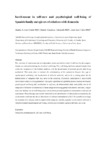Mostrar o rexistro simple do ítem
Involvement in self-care and psychological well-being of spanish family caregivers of relatives with dementia
| dc.contributor.author | Alonso-Cortés, Beatriz | |
| dc.contributor.author | González Cabanach, Ramón | |
| dc.contributor.author | Seco-Calvo, Jesús | |
| dc.date.accessioned | 2022-05-06T08:51:30Z | |
| dc.date.available | 2022-05-06T08:51:30Z | |
| dc.date.issued | 2020-09-15 | |
| dc.identifier.citation | Alonso-Cortés B, González.Cabanach R, Seco-Calvo J. Involvement in self-care and psychological well-being of spanish family caregivers of relatives with dementia. Health Soc Care Community. 2021;29(5):1308-1316 | es_ES |
| dc.identifier.issn | 0966-0410 | |
| dc.identifier.uri | http://hdl.handle.net/2183/30609 | |
| dc.description | Observational study | es_ES |
| dc.description.abstract | [Abstract] The provision of continuous care to a dependent person can lead to a lack of self-care by the caregiver themselves with corresponding low levels of well-being. This well-being has been analysed mostly from within the perspective of the hedonic tradition, with the development of personal growth often being overlooked. This study aims to increase the understanding of the connection between this type of psychological well-being and involvement in self-care activities, and to be a starting point for the determination of categories that may serve in the screening of potential participants in social-health interventions where it is being promoted. Taking the hypothesis of a probable positive connection between psychological well-being and involvement in self-care, an observational study was carried out on 45 caregivers of relatives with dementia. In those caregivers showing greater dedication to self-care, a higher score was obtained on the well-being scales connected to personal significance and positive emotions and experiences. These findings were further reinforced by the identification of other positive connections, the involvement in self-care and the six dimensions of wellness contemplated by Ryff. It is possible to envisage the existence of a virtuous circle in respect of the caregiver, whereby a greater involvement in self-care is related to a higher psychological well-being, which in turn is related to greater self-care, and so on. | es_ES |
| dc.language.iso | eng | es_ES |
| dc.publisher | Wiley | es_ES |
| dc.relation.uri | https://doi.org/10.1111/hsc.13171 | es_ES |
| dc.rights | This is the peer reviewed version of the article which has been published in final form at Wiley Online Library. This article may be used for non-commercial purposes in accordance with Wiley Terms and Conditions for Use of Self-Archived Versions. This article may not be enhanced, enriched or otherwise transformed into a derivative work, without express permission from Wiley or by statutory rights under applicable legislation. Copyright notices must not be removed, obscured or modified. The article must be linked to Wiley’s version of record on Wiley Online Library and any embedding, framing or otherwise making available the article or pages thereof by third parties from platforms, services and websites other than Wiley Online Library must be prohibited. | es_ES |
| dc.subject | Caregivers | es_ES |
| dc.subject | Personal growth | es_ES |
| dc.subject | Self-care | es_ES |
| dc.subject | Well-being | es_ES |
| dc.title | Involvement in self-care and psychological well-being of spanish family caregivers of relatives with dementia | es_ES |
| dc.type | info:eu-repo/semantics/article | es_ES |
| dc.rights.access | info:eu-repo/semantics/openAccess | es_ES |
| UDC.journalTitle | Health and Social Care in the Community | es_ES |
| UDC.volume | 29 | es_ES |
| UDC.issue | 5 | es_ES |
| UDC.startPage | 1308 | es_ES |
| UDC.endPage | 1316 | es_ES |
Ficheiros no ítem
Este ítem aparece na(s) seguinte(s) colección(s)
-
GI-IPRF - Artigos [139]






